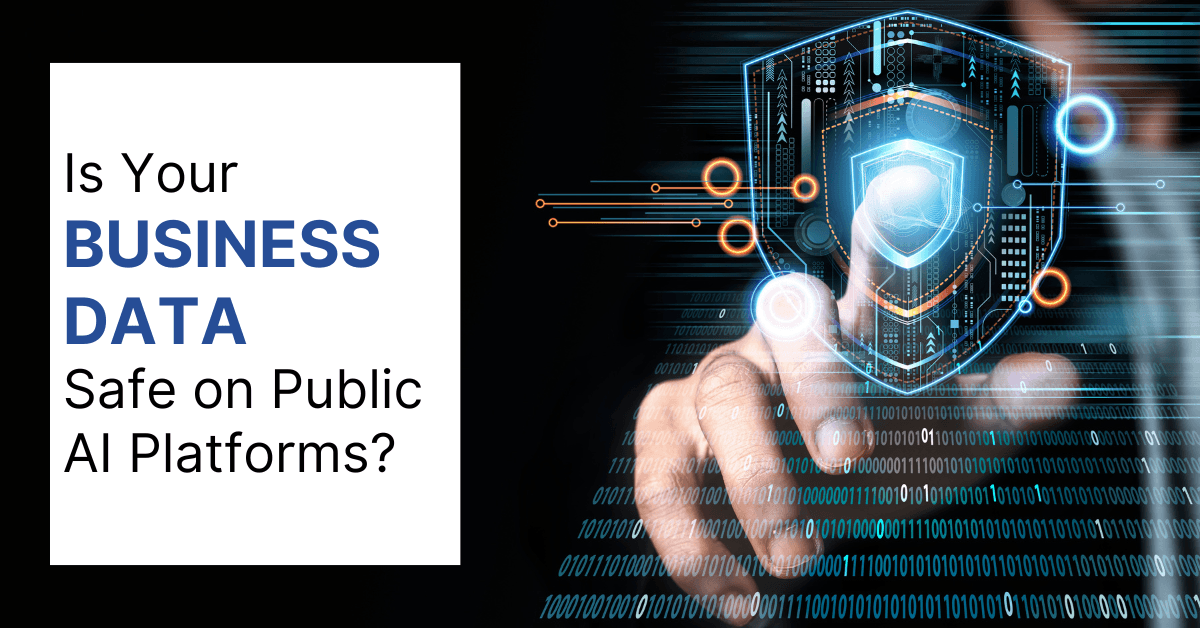We live in the age of Artificial Intelligence (AI), where companies—large and small—are taking giant leaps into a future that promises more automation, sharper decision-making, and, of course, higher efficiency. Exciting, right? AI tools like ChatGPT, Google Gemini, or Claude are all the rage, revolutionizing how businesses operate. But, let’s press pause for a moment. With all this promise, there comes a trade-off, and it’s one many companies might not yet be fully aware of: Is your business data truly safe when fed into public AI platforms?
You’ve probably already guessed the answer: Not always. As businesses turn to AI, they often overlook the fine print—or simply get too caught up in the “now” to consider potential AI privacy risks. Honestly, who can blame them? There’s a rush to keep up, to compete, but those fantastic AI tools might be handing your competitors (or worse, cybercriminals) a peak into your secret sauce without you even realizing it.
Data Privacy in AI: What’s the Deal?
Alright, let’s break it down. Data privacy is all about protecting the personal information—whether it’s yours, your client’s, or your company’s—that gets collected, processed, and stored. Here’s where things get a little tricky. When you use a public AI platform, massive datasets—say, your customer info, purchasing records, or even internal business strategies—are fed into the system to “train” the AI.
Great, right? Well, not so fast. While this helps the AI become, well, smarter (and deliver better results), it also opens a door—a potentially wide and unguarded one—where your business data might wander out, with unintended eyes watching.
Imagine this: You drop your sensitive procurement strategies or customer insights into a public AI system. Where does it go? Who else can see it? It’s like leaving your company’s most prized possessions in a crowded room and hoping no one spots them. Data protection, in this scenario, becomes a fingers-crossed situation. Why risk handing over your private playbook when you’re not sure it’s under lock and key?
Why Public AI Platforms Are Risky for Business Data
Here’s the rub: many companies, in their rush to exploit free Artificial intelligence tools, are unaware of just how vulnerable they may be leaving themselves. Sure, these platforms are useful—brilliant, even—but they’re trained on mountains of data from millions of users. Guess whose data gets mixed into this pot? Yup, yours. And the repercussions of a mishandled dataset could be… well, messy.
You might assume these platforms come with robust security guarantees, but they’re not bulletproof! Data breaches, unauthorized sharing, security goofs—it can all happen. And when it does, the data you put in might be recycled into the model, aiding other users (even competitors!) to fine-tune their own systems. Yikes.
Consider this scenario. Say you’re running an eCommerce business and feed AI with detailed metrics. A little while later, you realize a new competitor has popped up, with similar strategies. Makes you wonder: Did my own data just help them fast-track their way to my market?
1. Finance
In finance, the stakes feel even higher. Financial firms manage sensitive information like personal details, credit histories, bank transactions, and more. That means, if a public AI platform is compromised, the aftermath could be a perfect storm of financial loss, broken trust, and even lawsuits. And here’s the cherry on top: regulations like GDPR and PCI DSS usher in strict penalties for non-compliance. Oh, you didn’t protect that credit data? Here’s a fine bigger than your Artificial intelligence savings!
2. Healthcare
Now, healthcare—that’s a beast of its own. Hospitals and medical businesses handle personal health info, treatment records, and insurance details. These are gold mines for cybercriminals. Mistakenly putting patient records into a public Artificial intelligence system might violate HIPAA regulations faster than you can blink. One leak, and boom: lawsuits, outcry, fines. Is the convenience of public AI worth that kind of PR and financial hit?
3. E-Commerce
In eCommerce, customer data—like buying habits, payment methods, and preferences—are kings and queens. Leaking that data via a public AI environment can be disastrous. If your competitors get their hands on your customer insights, it’s game over. Worse yet, if hackers get involved, identity theft or fraudulent transactions could ruin your brand’s image—and cost millions in damages.
Are Public AI Platforms Worth The Potential Privacy Risks?
After all this, you might be asking, “Well, should we avoid free AI tools altogether?” Not necessarily. But it’s critical to weigh the risks, especially when handling sensitive personal information or proprietary data. Now, let me be clear, these public platforms aren’t bad. They just come with strings attached—strings you need to be aware of before handing over the keys to your digital kingdom.
Want a more secure solution? Companies are turning to custom models tailor-made for their specific security needs. While this option might come with a price tag, the peace of mind that your business data isn’t floating around where it shouldn’t be? Priceless. You keep control—out of sight, out of reach, out of danger.
Final Thought: Is Convenience Worth the Cost?
Before leaping into Artificial intelligence adoption, especially using public platforms, it’s smart to step back and think: Can my business afford the risks? If one data breach leads to proprietary information slipping into the wrong hands, any short-term gain from convenient AI solutions gets scrubbed out—fast.
In our next post, we’ll delve deeper into custom AI models and how they’re helping businesses sleep easier at night. Because, sometimes, free isn’t really free, after all.





